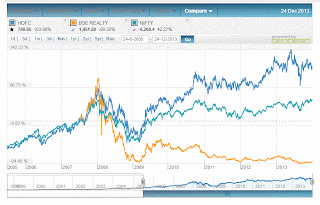I have posted on the property market in India before and have argued that prices appear to be too high to justify value. Well, some time has lapsed, and nothing much seems to have changed in the market.
There are innumerable stories floating around how people have made money in the property market in India. This is one of them. Some of my friends have made a lot of money as well. While I have not been a party to it, they are amazed at that; they consider that I haven't been able to analyze the prospects of the real property. After all, typical Indians invest in two assets: real property and gold; they usually utilize black money for these purposes. Their argument that under current regulation they do not want to pay undue taxes on their hard earned money may appear to be a little far-fetched.
That said, I have my views on both as investments: gold is a dead-investment; and it is difficult to find value in investment in real property.
Let us come back to the real property. The investments could be in land or building; house or apartment; commercial or residential. I don't think that prevailing prices for these assets relate to their value. Valuing a real property is no different from valuing any other cash flow producing asset such as a business or a share in stock of a business.
Thus, value of a real property is the present value of its cash flows over its life discounted at the right cost of capital. Rentals represent cash inflows; there are no other fundamental sources. Costs of maintenance, such as repairs, co-op society charges, municipal fees represent cash outflows. Estimating terminal value becomes a bit dodgy; nevertheless, it is imperative to estimate it based on perpetual rentals if there is a perpetual period; if there is a finite life, that issue is not there. However, the most bizarre thing to do is to use a terminal value multiple; it is like mixing coke with yogurt; yuck!
I find that prices are ridiculously far away from value. I can argue that either prices are far too high, or the rentals have not caught up with the present economic conditions, i.e. rentals are far too low. In the absence of any evidence, I would like to stick to the former argument.
Why else would a sub-urban Mumbai apartment fetching annual rentals of Rs.300,000 should sell at Rs.12.5 m? Or the one with annual rentals of Rs.180,000 should sell at Rs.7.5 m? Remember, rentals are not free cash flows. A plot of land measuring about 1089 square feet in a remote small town currently sells at Rs.1 m; the price was about Rs.150,000 just about five years back; I don't see any significant improvement in economic conditions of that town or the residents to justify that price. The story is true in any part of India in the present times.
The funny part is due to poor regulation and urge to accumulate black money, most transactions are registered at a price far lower than the actual transaction price. The result is lower rentals, lower taxes and further investment in real property with black money; a vicious cycle.
The property developers use high leverage and unidentified sources of capital to finance the projects, and play strange games to influence prices. No wonder the realty stocks have faltered; however, I don't think that the developers' personal wealth has. These developers, private or listed, are not monitored and regulated adequately.
The current news is that prices are under threat, and that inventories of unsold properties are piling up in major cities; yet, there are no signs of prices falling.
I haven't got any answer to the questions, yet. Despite that people have been buying, prices have been going up and people have been making money; Only that I have not been party to this party.
Identifying the greater fool has been difficult so far. A bubble or a burst...you tell me.

No comments:
Post a Comment